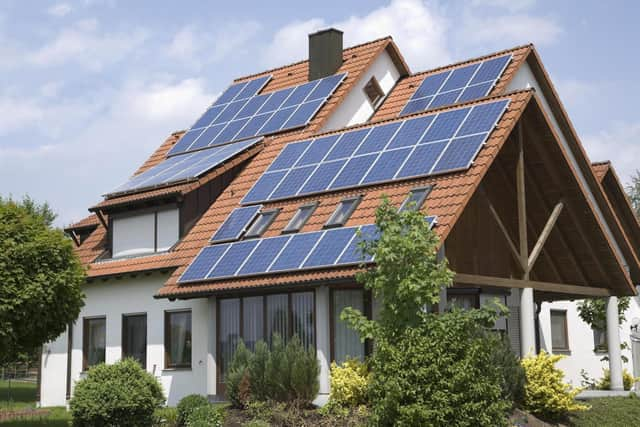Why I voted against the installation of a solar power scheme - Andy Brown
At a time of high and unreliable energy prices they provide power that is entirely free of any running costs and pays back the capital investment very handsomely on almost any roof that is facing in a convenient direction.
In such circumstances it is incredibly short sighted that any new building should be constructed without taking advantage of the rapid economic payback. The potential for better utilising existing roofs and for brownfield sites is enormous.
Advertisement
Hide AdAdvertisement
Hide AdSolar power improves our energy security, cuts our import bills and reduces household and business costs and thus inflation. Investing in its generation isn’t just a good thing for the environment. It is a good thing for our pockets.


There are, however, some things that are even more important than energy security. Food security is one of them. The solar installation that I helped to get rejected was on prime agricultural land. I took the view that as the climate becomes increasingly chaotic and unreliable there will be serious challenges for our food supply. Food is a more basic essential than power.
It is now clear that global temperatures are going to rise well above the level of 1.5 degrees above pre-industrial levels. That is the point at which scientists say that we can expect feedback mechanisms to be triggered that may take the changes to the climate out of human control. This summer there were entire months where global temperatures were already above the critical level. Instead of carbon emissions going down, last year saw them reach the highest level ever.
Since the plan is to only stop pumping more carbon into the atmosphere in 2050, we have to work on the assumption that the floods, the droughts, the fires and the exceptional winds that we’ve seen in recent summers will continue to get worse.
Advertisement
Hide AdAdvertisement
Hide AdThe floods in Greece this summer have wiped out the biggest area of good quality agricultural land in that country for over a decade. At the same time Spanish growers who supply much of the UK’s salad crops have seen their land dried out and crops wither under months of fierce sun.
When rice became scarce after recent extreme weather conditions in India and Pakistan both countries took the decision to ban all exports. Whenever food is in short supply it must be expected that governments will come under a lot of pressure to retain as much as they can of what is produced within their own borders.
Around 46 per cent of all the food produced in Britain is imported. At the moment that provides us with a cheap source of supply that keeps our supermarket shelves full not just of imported luxuries like avocados but also a lot of our basic essentials. It isn’t wise to be so heavily dependent on imports.
After the Second World War Winston Churchill told us in his memoirs that he never doubted that Britain and the allies would eventually prevail militarily. What he worried about was whether the country would be starved into defeat by the U boats sinking ships bringing in essential food supplies.
Advertisement
Hide AdAdvertisement
Hide AdBack then we responded to the crisis via campaigns to Dig For Britain and by persuading and controlling what people ate so heavily that wasteful consumption was avoided. We are not yet in anything like that situation but a bit of preparation in advance of significant problems is rarely a bad idea.
With war raging in the breadbaskets of Ukraine and Russia and with the horrible situation in the Middle East the world is not exactly in a very secure and stable position right now. If the predictions of the best scientists we have about climate deterioration are even vaguely right then we must expect increases in conflict as people fight over productive land and water rights. In such circumstances it becomes even more important to back our local farmers and to help them produce more and produce more sustainably. It also makes sense to educate our young people on how to eat well in line with the local seasons and to understand and value where their food comes from.
The last thing we should be doing is reducing tariffs on imported food in ways that undermine the long term viability of farming communities whilst increasing our dependence on purchasing food from abroad.
We need to be able to rely on much more of our food coming from local sources and to be helping farmers to connect with local food consumers. If that means we have to subsidise responsible production more heavily then we should be all behind a good use of public money. If it turns out that peace and harmony break out over the next few decades and there is a glut of readily available supplies of cheap imported food then the worst that better subsidies would do would be to help out our own farmers.
Andy Brown is the Green Party councillor for Aire Valley in North Yorkshire.